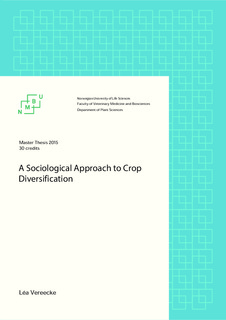A sociological approach to crop diversification
Master thesis
Permanent lenke
http://hdl.handle.net/11250/2359285Utgivelsesdato
2015-11-04Metadata
Vis full innførselSamlinger
- Master's theses (IPV) [240]
Sammendrag
Worldwide the diversity of cultivated plant species decreased for the past decades under the influence of the fast development of farming technologies. This lack of diversity has environmental impacts including water pollution. At a national scale, in developed countries it appears that agricultural sector is structurally locked-in this situation. However local initiatives involving agricultural stakeholders and local institutions appear as promising way to increase crop diversity. Increasing understanding of farmers and market on a defined territory was seen as a way to better target initiatives oriented toward crop diversification. To answer the need for water quality improvement, focus was made on low-input crops. An overview of current situation was drawn by short market assessment and a deep analysis of farmers’ behaviors and attitudes. Through semi-directive interview, I brought to light structural and psycho-sociological factors associated to crop diversification. Main finding is that farmers’ behavior toward their peers and their priority management are the first factors to consider in programs which aim at increasing crop diversity. Scenarios involving local institutions and stakeholders with a shared goal of increasing crop diversity at a territory scale were shaped.

